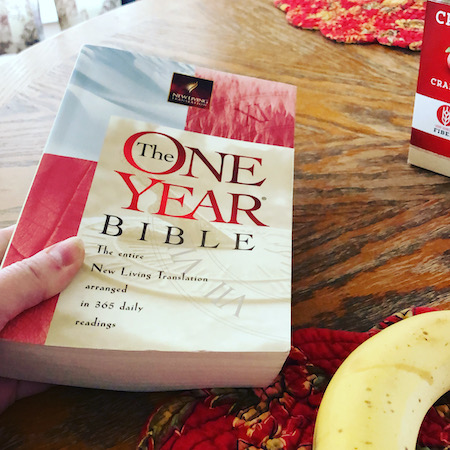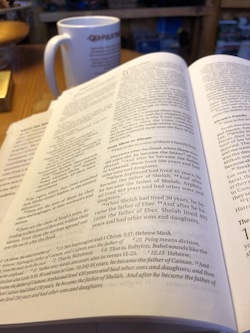Never read a Bible verse (or even few verses together) out of context. Never. Really. I mean it.
Last Thursday, it was a little after 6 a.m. I had a coffee cup in my left hand, a very large dog to my right side, and the Bible open on my lap, as I read from 1 John:
“As for you, see that what you have heard from the beginning remains in you. If it does, you also will remain in the Son and in the Father. And this is what he promised us—eternal life” (2:24-25).
Whoa whoa whoa whoa whoa. “If”? What do you mean, “if”? There’s no “if” about eternal life. Once in, always in. Otherwise, it’s up to us. Otherwise, my good Calvinist doctrine of the perseverance of the saints is…exaggerated? Or wrong? Oh dear.
After all, the perseverance of the saints is right there in Chapter 18 of the Westminster Confession:
“They whom God hath accepted in his Beloved, effectually called and sanctified by his Spirit, can neither totally nor finally fall away from the state of grace; but shall certainly persevere therein to the end, and be eternally saved” (“Of the Perseverance of the Saints,” The Westminster Confession of Faith, Chapter 18).
I have friends who disagree with every fiber of their Baptist beings, so I know it’s not settled in the minds of all Christians. Still, I’ve always figured that, if my salvation were up to me, I was in trouble. I rely on God and God alone.
My devotional guide wasn’t trying to trick me. Its editors had pulled out verses 18-25 for me that morning, in no way intending to shake my faith, but, after only half a cup of coffee, I was shook.
Sitting in my office that afternoon, I turned to my commentaries. The verses come in the context of refuting false teaching. John, the son of Zebedee (or maybe one of his inner circle) was writing to these Christians because some teachers among them were leading them to separate Jesus from Christ. That separation denied the full humanity of Christ. Later, it was a heresy that would get the name docetism.
More to the point, this separation of Jesus from Christ had separated believers from each other. “Behind the pained rhetoric of 1 John 2:18-25 is a harrowing reality: for the first time in the NT record, a church has fallen apart over a matter of critical importance, a division that must surely have been experienced with shock by those whose tradition accentuated the church’s unity in Christ” [Clifton Black 405 NIB]
I’ve been through a church split. It wasn’t fun. In one of the earliest schisms, it seems that John was trying to get the people to remain in right teaching. Remaining in Christ was still up to God. Cue the sigh of relief. The perseverance of the saints was not being thrown into question, only my judgment at letting isolated verses so confuse me.
And, really, I didn’t even need the commentaries to straighten me out. All I would have had to do was let my eyes skim a little higher in the same chapter.
“I write to you, young men, because you are strong, and the word of God lives in you, and you have overcome the evil one” (2:14b).
“Lives in you” translates from the Greek meno, the very same word used in 2:24 where it’s translated “remain.” The New Revised Standard conveniently translates it to the same word in English throughout the chapter.
The Word of God “remains in you” (2:14b), so “remain” in it (2:24).
This seemingly nonsensical marriage of the indicative and the imperative is all over scripture. It was there in Genesis 12, when Abraham was told he was blessed to be a blessing. The apostle Paul tells the people in his churches, over and over, “You’re holy, so be holy.” Jesus joins them. “You are the light,” he says, “so shine.” Because of who you are, this is what you’ll do.
“The Christian life is not passive or solitary; it is a life lived before others and before the face of God. Our goodworks never merit a right standing before God, but they inevitably and necessarily demonstrate that this right standing has been imputed to us” (here).
John isn’t making salvation contingent upon anything. He’s just trying to wrench the people back to right doctrine in hopes it will hold that church together.
So, no, our salvation isn’t up to us “if” we believe the right things. What is up to us is to try our best to take those beliefs seriously and not be led astray by the newest, hippest teacher on TV or TikTok or anywhere else.
And you know what else is up to us? To remember and commit to not taking isolated scripture verses out of context. Even on half a cup of coffee.



 It’s early. I do my Bible reading first in my day, which means I’m often still shaking off last night’s dreams. My coffee’s on my left; our two sleepy dogs are on my right, and words are swimming in front of my eyes.
It’s early. I do my Bible reading first in my day, which means I’m often still shaking off last night’s dreams. My coffee’s on my left; our two sleepy dogs are on my right, and words are swimming in front of my eyes.